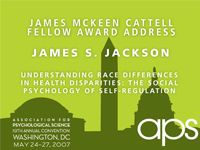I Need to Hold Your Hand: The Social Regulation of Emotion
Have you ever wondered why people surrounded by friends or family appear happier and healthier? Or why a mother’s hand so quickly soothes a scared child? University of Virginia researcher James Coan addressed these and similar questions in his invited talk, “Toward a Neuroscience of the Social Regulation of Emotion,” at the APS 19th Annual Convention in Washington, DC. He also discussed the growing body of research showing that social contact serves as a buffer between life’s stressors and our health and happiness.
From an evolutionary perspective, Coan pointed out that, “in many situations, negative emotions are very useful,” and that an intense initial physiological response to threat most likely saved our ancestors’ lives by allowing them to escape from predators in the savannah. However, this interaction between fight or flight response and our environment has become more complex as humans have evolved. Stress has become a chronic factor in our daily lives, putting us at greater risk for heart disease, impaired immune function, and even an overall decline in cognition.
This is where back rubs and beach vacations come in handy, right? Well, Coan was quick to point out that humans are, in fact, not the only mammals who take personal days. Coan referenced a recent study that claims that maternal presence reduces fear in infant “critters” across several species. More specifically, grooming, familiarity, and close proximity not only reduce glucocorticoid levels in some animals — reducing their individual stress reactivity — but increase the animals’ willingness to explore new environments.
Working at the intersection of social psychology and neuroscience, Coan uses functional magnetic resonance imaging (fMRI) and electroencephalography (EEG) to assess the effects of social contact on health and well-being. In one such study, Coan and colleague John Gottman measured the degree to which a humorous statement by a wife would reduce her husband’s heart rate during an argument. The results show that husband’s hearts, whether happy, unhappy, or divorced, benefit from a bit of laughter during the tiff.
Husbands are not the only ones who benefit from spousal contact. In a study published in Psychological Science (December 2006), Coan focused on the regulatory effect of hand-holding during a stressful event. Coan had 16 married women undergo an fMRI, during which he administered a small electric shock while each woman held her husband’s hand, a stranger’s hand, or no hand at all. Women reported less unpleasantness while holding their husband’s hand and even slightly lower stress levels while holding the hand of a stranger. These results could not be chalked up to politeness either, as fMRI scans confirmed their feelings.
Most strikingly, the effects of spousal handholding varied depending on marital quality, with happier couples feeling the most relief. The regulatory effect was so strong that one woman emerged from the fMRI sobbing. Initially misunderstanding the tears, “I thought for sure I was going to get shut down,” Coan said. Fortunately, they were tears of joy, as the woman recalled holding her husband’s hand during labor many years ago.
Coan said that some of his future research might focus on the effects of meditation, especially mindfulness meditation, in which a per-son becomes intentionally aware of his or her thoughts and actions in the present moment, although for now he remains focused on relationship quality and its vital role in warding off harmful health effects from stressors. But his research provides some clues into behavioral changes — for example, strengthening the bond between partners and friends — that can increase not just our quality of life but stress-related health conditions such as heart disease and others.




APS regularly opens certain online articles for discussion on our website. Effective February 2021, you must be a logged-in APS member to post comments. By posting a comment, you agree to our Community Guidelines and the display of your profile information, including your name and affiliation. Any opinions, findings, conclusions, or recommendations present in article comments are those of the writers and do not necessarily reflect the views of APS or the article’s author. For more information, please see our Community Guidelines.
Please login with your APS account to comment.